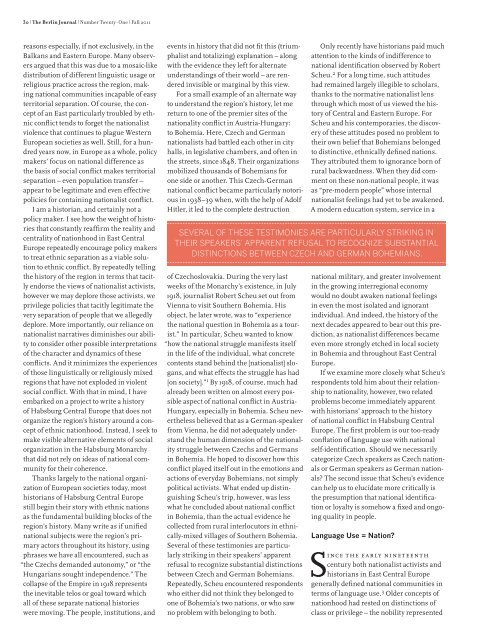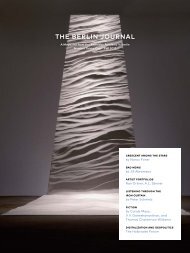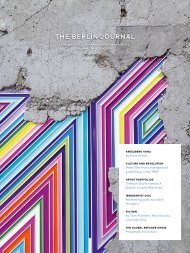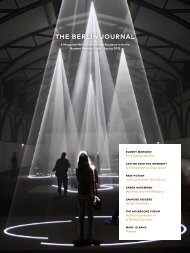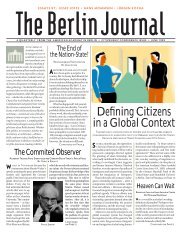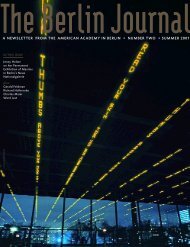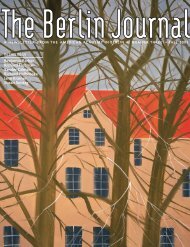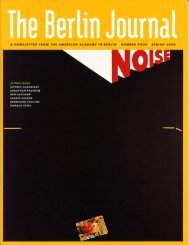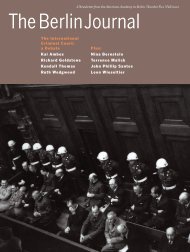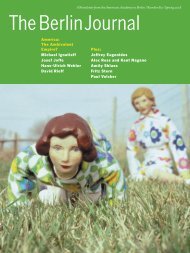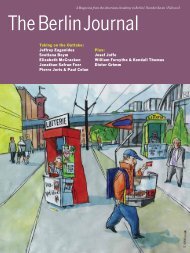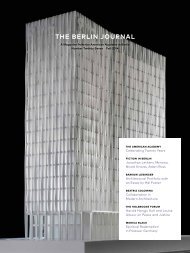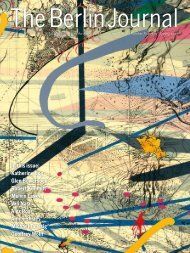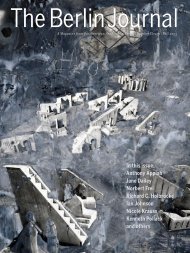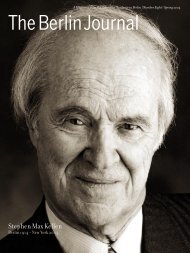Fall 2011 | Issue 21
- No tags were found...
Create successful ePaper yourself
Turn your PDF publications into a flip-book with our unique Google optimized e-Paper software.
30 | The Berlin Journal | Number Twenty-One | <strong>Fall</strong> <strong>2011</strong><br />
reasons especially, if not exclusively, in the<br />
Balkans and Eastern Europe. Many observers<br />
argued that this was due to a mosaic-like<br />
distribution of different linguistic usage or<br />
religious practice across the region, making<br />
national communities incapable of easy<br />
territorial separation. Of course, the concept<br />
of an East particularly troubled by ethnic<br />
conflict tends to forget the nationalist<br />
violence that continues to plague Western<br />
European societies as well. Still, for a hundred<br />
years now, in Europe as a whole, policy<br />
makers’ focus on national difference as<br />
the basis of social conflict makes territorial<br />
separation – even population transfer –<br />
appear to be legitimate and even effective<br />
policies for containing nationalist conflict.<br />
I am a historian, and certainly not a<br />
policy maker. I see how the weight of histories<br />
that constantly reaffirm the reality and<br />
centrality of nationhood in East Central<br />
Europe repeatedly encourage policy makers<br />
to treat ethnic separation as a viable solution<br />
to ethnic conflict. By repeatedly telling<br />
the history of the region in terms that tacitly<br />
endorse the views of nationalist activists,<br />
however we may deplore those activists, we<br />
privilege policies that tacitly legitimate the<br />
very separation of people that we allegedly<br />
deplore. More importantly, our reliance on<br />
nationalist narratives diminishes our ability<br />
to consider other possible interpretations<br />
of the character and dynamics of these<br />
conflicts. And it minimizes the experiences<br />
of those linguistically or religiously mixed<br />
regions that have not exploded in violent<br />
social conflict. With that in mind, I have<br />
embarked on a project to write a history<br />
of Habsburg Central Europe that does not<br />
organize the region’s history around a concept<br />
of ethnic nationhood. Instead, I seek to<br />
make visible alternative elements of social<br />
organization in the Habsburg Monarchy<br />
that did not rely on ideas of national community<br />
for their coherence.<br />
Thanks largely to the national organization<br />
of European societies today, most<br />
historians of Habsburg Central Europe<br />
still begin their story with ethnic nations<br />
as the fundamental building blocks of the<br />
region’s history. Many write as if unified<br />
national subjects were the region’s primary<br />
actors throughout its history, using<br />
phrases we have all encountered, such as<br />
“the Czechs demanded autonomy,” or “the<br />
Hungarians sought independence.” The<br />
collapse of the Empire in 1918 represents<br />
the inevitable telos or goal toward which<br />
all of these separate national histories<br />
were moving. The people, institutions, and<br />
events in history that did not fit this (triumphalist<br />
and totalizing) explanation – along<br />
with the evidence they left for alternate<br />
understandings of their world – are rendered<br />
invisible or marginal by this view.<br />
For a small example of an alternate way<br />
to understand the region’s history, let me<br />
return to one of the premier sites of the<br />
nationality conflict in Austria-Hungary:<br />
to Bohemia. Here, Czech and German<br />
nationalists had battled each other in city<br />
halls, in legislative chambers, and often in<br />
the streets, since 1848. Their organizations<br />
mobilized thousands of Bohemians for<br />
one side or another. This Czech-German<br />
national conflict became particularly notorious<br />
in 1938–39 when, with the help of Adolf<br />
Hitler, it led to the complete destruction<br />
of Czechoslovakia. During the very last<br />
weeks of the Monarchy’s existence, in July<br />
1918, journalist Robert Scheu set out from<br />
Vienna to visit Southern Bohemia. His<br />
object, he later wrote, was to “experience<br />
the national question in Bohemia as a tourist.”<br />
In particular, Scheu wanted to know<br />
“how the national struggle manifests itself<br />
in the life of the individual, what concrete<br />
contents stand behind the [nationalist] slogans,<br />
and what effects the struggle has had<br />
[on society].” 1 By 1918, of course, much had<br />
already been written on almost every possible<br />
aspect of national conflict in Austria-<br />
Hungary, especially in Bohemia. Scheu nevertheless<br />
believed that as a German-speaker<br />
from Vienna, he did not adequately understand<br />
the human dimension of the nationality<br />
struggle between Czechs and Germans<br />
in Bohemia. He hoped to discover how this<br />
conflict played itself out in the emotions and<br />
actions of everyday Bohemians, not simply<br />
political activists. What ended up distinguishing<br />
Scheu’s trip, however, was less<br />
what he concluded about national conflict<br />
in Bohemia, than the actual evidence he<br />
collected from rural interlocutors in ethnically-mixed<br />
villages of Southern Bohemia.<br />
Several of these testimonies are particularly<br />
striking in their speakers’ apparent<br />
refusal to recognize substantial distinctions<br />
between Czech and German Bohemians.<br />
Repeatedly, Scheu encountered respondents<br />
who either did not think they belonged to<br />
one of Bohemia’s two nations, or who saw<br />
no problem with belonging to both.<br />
Only recently have historians paid much<br />
attention to the kinds of indifference to<br />
national identification observed by Robert<br />
Scheu. 2 For a long time, such attitudes<br />
had remained largely illegible to scholars,<br />
thanks to the normative nationalist lens<br />
through which most of us viewed the history<br />
of Central and Eastern Europe. For<br />
Scheu and his contemporaries, the discovery<br />
of these attitudes posed no problem to<br />
their own belief that Bohemians belonged<br />
to distinctive, ethnically defined nations.<br />
They attributed them to ignorance born of<br />
rural backwardness. When they did comment<br />
on these non-national people, it was<br />
as “pre-modern people” whose internal<br />
nationalist feelings had yet to be awakened.<br />
A modern education system, service in a<br />
SEVERAL OF THESE TESTIMONIES ARE PARTICULARLY STRIKING IN<br />
THEIR SPEAKERS’ APPARENT REFUSAL TO RECOGNIZE SUBSTANTIAL<br />
DISTINCTIONS BETWEEN CZECH AND GERMAN BOHEMIANS.<br />
national military, and greater involvement<br />
in the growing interregional economy<br />
would no doubt awaken national feelings<br />
in even the most isolated and ignorant<br />
individual. And indeed, the history of the<br />
next decades appeared to bear out this prediction,<br />
as nationalist differences became<br />
even more strongly etched in local society<br />
in Bohemia and throughout East Central<br />
Europe.<br />
If we examine more closely what Scheu’s<br />
respondents told him about their relationship<br />
to nationality, however, two related<br />
problems become immediately apparent<br />
with historians’ approach to the history<br />
of national conflict in Habsburg Central<br />
Europe. The first problem is our too-ready<br />
conflation of language use with national<br />
self-identification. Should we necessarily<br />
categorize Czech speakers as Czech nationals<br />
or German speakers as German nationals?<br />
The second issue that Scheu’s evidence<br />
can help us to elucidate more critically is<br />
the presumption that national identification<br />
or loyalty is somehow a fixed and ongoing<br />
quality in people.<br />
Language Use = Nation?<br />
Since the early nineteenth<br />
century both nationalist activists and<br />
historians in East Central Europe<br />
generally defined national communities in<br />
terms of language use. 3 Older concepts of<br />
nationhood had rested on distinctions of<br />
class or privilege – the nobility represented


